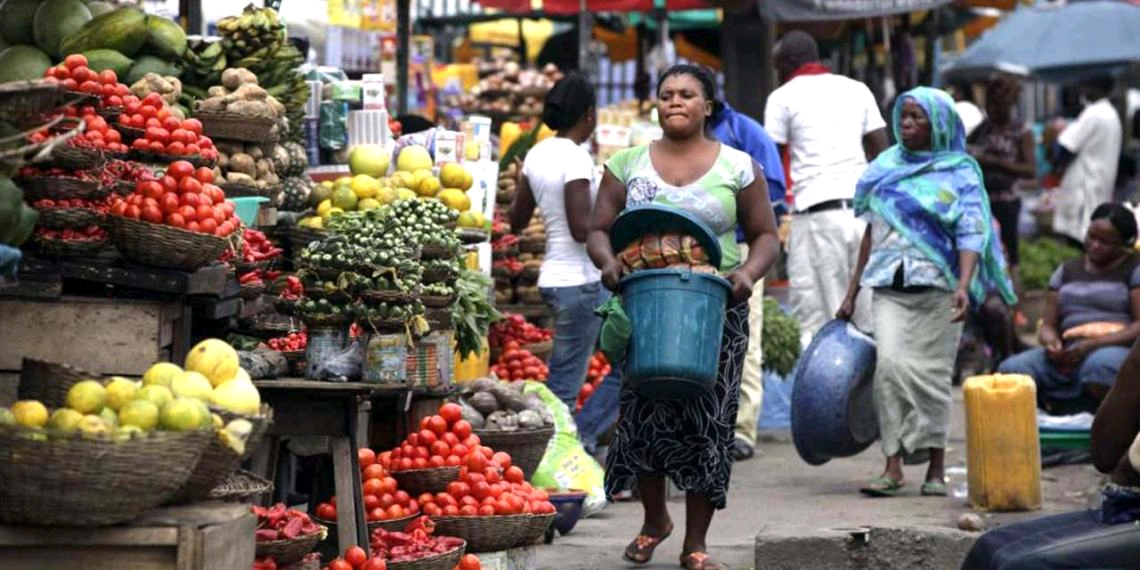Nigeria’s annual inflation rate rose to 24.23 per cent in March from 23.18 per cent in February 2025, the National Bureau of Statistics (NBS) said on Tuesday.
The statistics office said the March 2025 headline inflation rate showed an increase of 1.05 per cent compared to the February 2025 headline inflation rate.
On a month-on-month basis, it said the headline inflation rate in March 2025 was 3.90 per cent, which was 1.85 per cent higher than the rate recorded in February 2025 (2.04 per cent).
This, it said, means that in March 2025, the rate of increase in the average price level is higher than the rate of increase in the average price level in February 2025.
Food inflation
The NBS said the food inflation rate in March 2025 was 21.79 per cent on a year-on-year basis. However, on a month-on-month basis, the Food inflation rate in March 2025 was 2.18 per cent, up by 0.50 per cent compared to February 2025 (1.67 per cent).
It said the increase can be attributed to the rate of increase in the average prices of ginger (fresh), garri (yellow), broken rice (ofada), honey (natural production), crabs, potatoes, plantain flour, periwinkle (unshelled), pepper (fresh), etc.
Nigeria has experienced a sharp increase in food prices in recent years. This trend worsened in 2023 following President Bola Tinubu’s removal of petrol subsidies and adopting a floating exchange rate for the naira.
This shift has led to a steep increase in the cost of staple food, pushing many Nigerians further into poverty and heightening food insecurity.
The persistent price surge over the past year has led to several farms and businesses closing, with many agricultural producers scaling back their output due to insecurity and unpredictable weather conditions affecting rural areas.
In response, Tinubu declared a state of emergency on food insecurity in July 2023, aiming to combat rising food costs. Despite these efforts, at the time, food inflation has continued unabated.
In July last year, Tinubu unveiled some proactive measures to address skyrocketing food prices in the country. Amongst these is the decision to suspend duties, tariffs, and taxes on importing essential food items such as beans, wheat, and husked brown rice.
In January, the NBS said Nigeria’s annual inflation rate dropped to 24.48 per cent in January from 34.80 per cent in December 2024 after rebasing.
Breakdown
In its inflation report Tuesday, the NBS said the contributions of items on the divisional year-on-year level to the increase in the headline index are food & non-alcoholic beverages (9.28 per cent), restaurants and accommodation services (2.99 per cent), transport (2.47 per cent), housing, water, electricity, gas & other fuel (1.95 per cent), education services (1.44 per cent), health (1.40 per cent), clothing & footwear (1.17 per cent).
Others are information and communication (0.76 per cent), personal care, social protection, and miscellaneous goods and services (0.76 per cent), furnishing, household equipment, and routine household maintenance (0.69 per cent), insurance and financial services (0.11 per cent), alcoholic beverage, tobacco and narcotics (0.09 per cent) and recreation, sport and culture (0.07 per cent).
The report said the Consumer Price Index (CPI) rose to 117.34 in March 2025 reflecting a 4.40-point increase from the preceding month.
On a year-on-year basis, the NBS said in March 2025, the Urban inflation rate was 26.12 per cent. On a month-on-month basis, the Urban inflation rate was 3.96 per cent in March 2025, up by 1.56 per cent compared to February 2025 (2.40 per cent).
It explained that the Rural inflation rate in March 2025 was 20.89 per cent on a year-on-year basis. On a month-on-month basis, the Rural inflation rate in March 2025 was 3.73 per cent, up by 2.57 per cent compared to February 2025 (1.16 per cent).
Premium Times

